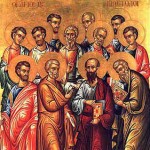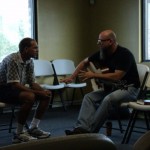To encourage active participation when we gather with the church
Let’s be honest. For the majority of Christians (especially in the west), “church” means attending a weekly event in which there is singing, praying, giving, and listening. God works through these events in many different ways. However, I think that God intends to work even more to bring his children to maturity by working through more of them when they gather together.
Obviously, when we see the church as God’s people gathered together (and not defined by some specific activities, location, organization, etc.), then any time we come together with other brothers and sisters in Christ, we are the church. These times of gathering together with other believers are designed to be interactive, conversational, mutual.
But, there’s a huge divide between the passive “church” experience of most western Christians and the active gatherings that I’ve just described. Sometimes, even when people realize that something is missing – and that they should “participate” – the believers still do not know how to break through the barrier of what they’ve been taught is “church”… “worship”… “holy.”
Kathleen at “Church in a Circle” has offered “7 ways to turn your passive church service into an active learning experience.”
Briefly, here are Kathleen seven ways to help people move from passive listening to being “involved and participating”:
- Get them moving.
- Make it fun!
- Use all the senses.
- Let them discover it.
- Get them talking.
- Share an experience.
- Reflection and response.
Be sure to read Kathleen’s post. She explains each of the points above in detail.
I’d like to add a few others to consider, especially by those who are seen as leaders among the church:
- Don’t be afraid of silence.
Give the Spirit time to work in the hearts of the people who are struggling to know when and how to participate. If you (or other leaders) are filling all the time speaking, the others will never speak because they don’t have opportunity.
- Don’t respond to everything that’s said.
In other words, don’t feel like you always must have the last word, even if you think you can explain something better. Don’t do it.
- Sometimes, don’t say anything.
This is self explanatory. But, at some gatherings, don’t say anything at all, unless it is to thank someone else for what they said.
What would you add, change, or removed from the advice above to help people move from passive gatherings to actively participating in helping one another grow in maturity in Jesus Christ?
Why do we often respond differently to Jesus?
One day, a friend of ours asked about dealing with a brother or sister in Christ who seemed completely apathetic to following Jesus. That led to a good discussion and some good advice from others, but it also led to a good discussion between my wife Margaret and myself.
As Margaret and I were talking about this subject, I remembered something that I had noticed earlier. When Jesus talked about dealing with a brother or sister who “sins against you,” those listening to him responded differently to the way that people today often respond to that same teaching.
What am I talking about? Well, start with this familiar passage:
If your brother sins against you, go and tell him his fault, between you and him alone. If he listens to you, you have gained your brother. But if he does not listen, take one or two others along with you, that every charge may be established by the evidence of two or three witnesses. If he refuses to listen to them, tell it to the church. And if he refuses to listen even to the church, let him be to you as a Gentile and a tax collector. Truly, I say to you, whatever you bind on earth shall be bound in heaven, and whatever you loose on earth shall be loosed in heaven. Again I say to you, if two of you agree on earth about anything they ask, it will be done for them by my Father in heaven. For where two or three are gathered in my name, there am I among them. (Matthew 18:15-20 ESV)
Upon hearing or studying this passage, I’ve heard people respond with many questions, such as:
* Is this only for when a person sins directly again you, or is it also for someone who sins in general?
* Who should the one or two others be?
* What does it mean to “tell it to the church”? Who tells and when?
* What does it mean to treat the person “as a Gentile and a tax collector”?
* What does it mean to bind and loose?
* When Jesus says “where two or three are gathered,” is he only talking about “church discipline” or is he defining the church?
But, if we keep reading, we find that Jesus’ first audience responded quite differently:
Then Peter came up and said to him, “Lord, how often will my brother sin against me, and I forgive him? As many as seven times?” Jesus said to him, “I do not say to you seven times, but seventy-seven times. (Matthew 18:21-22 ESV)
Peter recognized something that we often miss: Jesus’ statements were about relationships. When faced with the potential of breaking a relationship, most people will ask for forgiveness (even if they don’t really mean it). Peter recognized this, and wondered how many times he would have to forgive this brother who continued to sin against him.
How did Jesus respond? Keep on going to them, and keep on forgiving them.
I think there are other examples, too. But, to me, this is an obvious example of Jesus’ listeners responding to him differently than we often respond to him. Perhaps their focus (and Jesus’ focus) was different than our focus as well.
What do you want to talk about?
My family jokes that I can talk to anyone. That’s probably not literally true, but I can usually talk to most people. There’s a very good reason that people usually talk to me: I ask them about themselves and their likes and dislikes, and I listen to their response.
I’ve found that people typically like to talk about themselves, especially to people who are genuinely interested in hearing about them.
Of course, that doesn’t meant that people immediately go into the intimate details of their lives, but as they learn that you will listen (and not tell everyone else), they soon learn to trust you with more and more personal information.
You know what? I’ve found the same thing happens on my blog. People like to think about, talk about, and write about different topics related to the church. Some people are passionate about one thing, while others care deeply about something else.
What about you? What topics (related to the church) would you like to see us discuss here?
Replay: Jesus is the Great High Priest
Six years ago, I wrote a post called “Jesus is the Great High Priest.” He is called “the great high priest” in the book of Hebrews, and when we start to examine what that author says about Jesus as priest, it is amazing. I enjoyed working through the various passages and determining the promises and presence that we have through our high priest. I learned so much from this exercise; I hope you find it beneficial as well.
———————————-
Jesus is the Great High Priest
I was tagged by Bryan at “Charis Shalom” to post five things I dig about Jesus. Besides the fact that I have never used the word “dig” in this context, I enjoyed thinking through this meme (it was groovy). In fact, I’ve decided to blog about each of my five things. The first thing that I dig is that Jesus is the Great High Priest.
I’ve grown to love the book of Hebrews. I love the way the author of Hebrews shows that the way of Jesus is far superior to the way of the law and ritual. In fact, Hebrews argues that Jesus is not only superior, but that the “former things” were mere shadows of the real things, which were initiated by Jesus himself.
One of the comparisons made by the author of Hebrews is between Jesus as High Priest and the priestly system that began with Aaron. The priest was responsible for offering bulls or goats as sacrifices, which were actually ineffective at removing sins. (Heb 9:13; 10:4) The priest was appointed to act as a mediator between God and man, but he had to offer sacrifices for himself and for his sins first, then he could enter the holy place in the tabernacle or temple. (Heb 5:1-3; 9:1-4) These ritualistic sacrifices had to be carried out continuously. (Heb 7:27) But, if these rituals were ineffective, then why did God command that they be carried out? Because they were a shadow (an imitation) of what was to come through Jesus Christ! (Heb 8:5; 10:1)
Jesus Christ, our Great High Priest, has now come. He has offered the perfect sacrifice (himself) once for all. (Heb 9:11-14) He does not need to offer this sacrifice continuously, because his death is sufficient. (Heb 7:27; 9:27-28) Now, Christ has entered into the very holy place – that is, into the presence of God himself. (Heb 9:24)
But, beyond what Christ did for us, Jesus as our Great High Priest continues to work on our behalf. Our Great High Priest does not die as other priests, but he lives forever! First, he mediates between us and God. (Heb 9:15; 12:22-24) Jesus intercedes on our behalf. (Heb 7:25) Finally, Jesus prepares the way for us to enter into the presence of God with him. (Heb 10:19-22)
Also, Jesus is not a high priest who is cold and distant. He is a high priest who came to us, who identifies with us, who suffered and was tempted as we are, and who is compassionate and sympathetic toward us! (Heb 4:15) This is the Great High Priest who ushers us into God’s presence, presenting our petitions when words fail us, mediating when we fail, lifting us when we fall, carrying us when we are too weak. This is the Great High Priest who will reign forever!
What does it mean for Jesus to be my Great High Priest? When someone tells me, “You can’t do that,” I just smile inside and remember the Great High Priest. When someone whispers, “God will not like you if you do that,” I nod and recognize that Jesus is mediating for me. When someone points out my sin and reminds me that I’m a loser, I remember that Jesus cleansed me of my sin and won on my behalf. When God seems distant because I have wandered far away from him, I remember that Jesus prepared a new and living way into the very presence of God, and He has given me permission to enter.
And, when I remember that I can’t do enough, and I can’t think enough, and I can’t say enough, and I can’t love enough, and I can’t serve enough… the Great High Priest reminds me that he did it all – once for all – and there’s nothing left for me to do, except to enter his rest – to abide with him.
This is the Great High Priest – the better priest who offered the better sacrifice in the better sanctuary to establish a better covenant over a better house. The shadows are no longer necessary because the light of the Son – our Great High Priest – has come and has conquered and is here.
The Disciples, the Apostles, and the Twelve
When I was growing up, I thought that the terms “disciples,” “apostles,” and “the twelve” all referred to the same group of twelve men who followed Jesus around between his baptism and his death, burial, resurrection, and ascension. In fact, I often heard the terms combined as in “the twelve disciples” or “the twelve apostles,” and I rarely heard the terms “disciples” or “apostles” used to refer to anyone other than “the twelve.”
Now, I understand that “the twelve” were “apostles,” but other people were apostles as well. I also understand that “the twelve” and the “apostles” were “disciples,” but other people were disciples as well.
Believe it or not, Matthew only uses the term “apostle” once. He uses the term “twelve” eight times. But, he uses the term “disciple” over 30 times. A few times, Matthew combines the terms: “twelve apostles” or “twelve disciples.” That clarification (i.e., the fact that Matthew occasionally says “the twelve disciples”) indicates that at times Matthew is using the term “disciple” to refer to a group that does not include ONLY the twelve.
It’s clear from reading the Gospels and Acts that many people – not just the Twelve – followed Jesus as his disciples. In fact, we learn in Acts 1, that at least 2 people – but probably more – followed Jesus from the time of his baptism by John and were still with the 120 when they were gathered in Jerusalem after Jesus’ ascension. (See Acts 1:21-23.)
Here’s a passage from Matthew, for example, that indicates that the term “disicples” was used to refer to more than just the twelve:
While he was still speaking to the people, behold, his mother and his brothers stood outside, asking to speak to him. But he replied to the man who told him, “Who is my mother, and who are my brothers?” And stretching out his hand toward his disciples, he said, “Here are my mother and my brothers! For whoever does the will of my Father in heaven is my brother and sister and mother.” (Matthew 12:47-50 ESV)
Why is this important? Well, think about these questions:
Who was in the boat with Jesus when he calmed the storm? (“And when he [Jesus] got into the boat, his disciples followed him…” Matthew 8:23 ESV)
Who did Jesus teach privately? (“Then he [Jesus] left the crowds and went into the house. And his disciples came to him, saying, ‘Explain to us the parable of the weeds of the field.'” Matthew 13:36 ESV)
Who did Jesus eat ‘the Last Supper’ with? (“He [Jesus] said, ‘Go into the city to a certain man and say to him, “The Teacher says, My time is at hand. I will keep the Passover at your house with my disciples.”‘” Matthew 26:18 ESV)
In the same way, we know that other people (besides the twelve) were referred to as “apostles,” especially in Acts and Paul’s epistles. Therefore, when we read that apostles said or did something, we cannot assume that the author was referring to the twelve. (However, as an interesting aside, perhaps Matthais was chosen to replace Judas as one of “the Twelve” in Acts 1:15-26.)
This passage by Paul specifically points out this difference:
For I delivered to you as of first importance what I also received: that Christ died for our sins in accordance with the Scriptures, that he was buried, that he was raised on the third day in accordance with the Scriptures, and that he appeared to Cephas, then to the twelve. Then he appeared to more than five hundred brothers at one time, most of whom are still alive, though some have fallen asleep. Then he appeared to James, then to all the apostles. Last of all, as to one untimely born, he appeared also to me. (1 Corinthians 15:3-8 ESV)
Did you notice that Paul makes a distinction between “the twelve” and “the apostles”? Notice that we see that Jesus also appears to “more than five hundred brothers (and sisters).”
So, we should be careful when we read these terms in Scripture. Otherwise, we might limit the scope and reference more narrowly than the authors intended.
Pervasive Mutuality – 1 Peter 4:7-11
Whenever I talk about mutuality, I tend to focus on a few passages, such as Ephesians 4:7-16 or 1 Corinthians 14:26-40. However, mutuality (the one-another’ing aspect of our lives together in Christ) is actually very pervasive (widespread) in Scripture.
One of those mutuality passages is 1 Peter 4:7-11. In his first letter, Peter writes about suffering while living in Christ. In chapter 4, Peter talks about those who are choose to live their own way and are surprised with God’s people refuse to go along with it.
According to Peter, what should our response be when we are maligned because we refuse to live according to immoral cultural norms? He writes:
The end of all things is at hand; therefore be self-controlled and sober-minded for the sake of your prayers. Above all, keep loving one another earnestly, since love covers a multitude of sins. Show hospitality to one another without grumbling. As each has received a gift, use it to serve one another, as good stewards of God’s varied grace: whoever speaks, as one who speaks oracles of God; whoever serves, as one who serves by the strength that God supplies—in order that in everything God may be glorified through Jesus Christ. To him belong glory and dominion forever and ever. Amen. (1 Peter 4:7-11 ESV)
So, what is Peter’s answer to living in a society filled with “living in sensuality, passions, drunkenness, orgies, drinking parties, and lawless idolatry”? (1 Peter 4:3 ESV) His answer is self-control, sober-mindedness, love, hospitality, and service. While the first couple of things (self-control and sober-mindedness) can be personal, the last three are very practices of mutuality: love, hospitality, and service.
In this passage, Peter stresses love, because, as he says, “love covers a multitude of sins.” It’s clear that he’s talking about sins among and between brothers and sisters in Christ, since he introduced this with “keep loving one another earnestly.” In other words, even when someone sins against you or sins against your sister/brother, keep on loving that person earnestly – really – truly – in deed, not just in words. (By the way, I find it both interesting and important that almost every “mutuality” passage in Scripture includes a focus on love.)
Next he encourages his readers to open their homes to one another and practice hospitality “without grumbling.” While hospitality is always an important way for us to demonstrate our love and support to our brothers and sisters in Christ, it becomes even more important when Christians are being persecuted. When we open our homes, we share our lives, and this is extremely important to our maturity in Christ.
Finally, Peter concludes this mutuality passage with a focus on spiritual gifts. Believe it or not, this is my favorite scriptural passage on spiritual gifts. Peter reminds us that these gives are given to us for the sake of others – to serve them -not for our own sake. I love how Peter boils down all spiritual gifts into two categories: speaking and serving. And, whenever we do those things, we do them from God, not from ourselves.
Once again we see that mutuality among the body of Christ is extremely important and is found throughout the writings of Scripture.
Pervasive Mutuality – Jude 20-23
Whenever I talk about mutuality, I tend to focus on a few passages, such as Ephesians 4:7-16 or 1 Corinthians 14:26-40. However, mutuality (the one-another’ing aspect of our lives together in Christ) is actually very pervasive (widespread) in Scripture.
One of those mutuality passages is Jude 20-23. Most people know that Jude writes about false teachers that had attached themselves to the church. He tells his readers that God would judge these false teachers just as he had judged others in history. But, what was the church supposed to do about these false teachers?
These are the only instructions that Jude gives directly to the believers reading his letter:
But you, beloved, building yourselves up in your most holy faith and praying in the Holy Spirit, keep yourselves in the love of God, waiting for the mercy of our Lord Jesus Christ that leads to eternal life. And have mercy on those who doubt; save others by snatching them out of the fire; to others show mercy with fear, hating even the garment stained by the flesh. (Jude 20-23 ESV)
Interestingly, Jude never tells his readers to confront the false teachers. He never tells them to correct them. That doesn’t mean that confrontation or correction is wrong. Instead, it shows that neither confrontation nor correction was the focus for Jude.
What was his focus? His focus was on the continued growth of the believers who were reading his letter. And, he knew that growth would only happen if they worked together to help each other grow in maturity – even in face of false teaching. Why? Because shared life and shared service and shared discipleship is stronger than any false teacher.
How were the believers supposed to respond to false teachers? By continuing to keep themselves in the love of God by building up (edifying) each other and praying. In other words, Jude’s response to false teachers is mutuality – the whole church working together to help each other mature in Jesus Christ. In fact, instead of telling his readers to respond or react to the false teachers, he tells them to “[wait] for the mercy of our Lord Jesus Christ.”
And, what should the church do about those who follow these false teachers? Again, mutuality is the answer. They are to show mercy to those who need it and rescue those who will accept their help.
Perhaps most interesting to me is the fact that, in the face of false teaching, Jude does not tell his readers to keep themselves in the “truth of God.” He tells them to keep themselves in the love of God. Obviously, there is some correlation between God’s truth and God’s love, but it’s intriguing that Jude focuses on God’s love as a response to false teaching.
And, again, it’s not each person keeping himself or herself in the love of God. Jude envisions the church working together to help each other reamin in the love of God. Once again, a beautiful picture of mutuality where we might not expect it.
Pervasive Mutuality – Hebrews 12:12-17
Whenever I talk about mutuality, I tend to focus on a few passages, such as Ephesians 4:7-16 or 1 Corinthians 14:26-40. However, mutuality (the one-another’ing aspect of our lives together in Christ) is actually very pervasive (widespread) in Scripture.
One of those mutuality passages is Hebrews 12:12-17. This passage follows the very famous passage at the beginning of Hebrews 12 in which the author exhorts his readers to set aside distractions and sin and to “look to Jesus.” Next, the readers are encouraged to trust God and his love for them in spite of any “discipline” they may be facing.
After that section on discipling (“For the Lord disciplines the one he loves”), the author writes:
Therefore lift your drooping hands and strengthen your weak knees, and make straight paths for your feet, so that what is lame may not be put out of joint but rather be healed. Strive for peace with everyone, and for the holiness without which no one will see the Lord. See to it that no one fails to obtain the grace of God; that no “root of bitterness” springs up and causes trouble, and by it many become defiled; that no one is sexually immoral or unholy like Esau, who sold his birthright for a single meal. For you know that afterward, when he desired to inherit the blessing, he was rejected, for he found no chance to repent, though he sought it with tears. (Hebrews 12:12-17 ESV)
From first glimpse, it appears that the author is exhorting each reader to lift up his own drooping hands or strengthen her own weak knees. It seems that each reader is instructed to make straight paths for each one’s own feet. However, as we keep reading, we realize that these commands are much more mutual than that, especially when we get to verse 15.
Although verse 15 in the translation above begins with a command, it is actually in the form of a participle: See[ing] to it that no on fails to obtain the grace of God. And, to make this an even stronger statement, the verb translated “See to it” is the same verb that is normally translated “oversee.” (It’s actually the same form of the verb found in 1 Peter 5:2 when Peter is addressing “elders.”)
Thus, the author is exhorting his readers to “oversee” each other to ensure that no one fails to live in the grace of God, that no “root of bitterness” grows in anyone’s heart, and that no one falls into sexual immorality. As you can tell, these are issues of spiritual oversight, and we are all responsible for “overseeing” each other.
From this passage especially, we can see that the meaning of the verb “oversee” is very close to the meaning of the verb “consider” in this passage (which is another of my favorite when it comes to mutuality):
And let us consider how to stir up one another to love and good works… (Hebrews 10:24 ESV)
Yes, it is all of our responsibilities to look into one another’s lives, to help each other follow Jesus Christ, and to help one another grow in maturity together. This is what mutuality among the church is all about.
Pervasive Mutuality – 1 Thessalonians 5:11-14
When I talk about or write about mutuality among the church, I tend to focus on a few passages, such as Ephesians 4:7-16 or 1 Corinthians 14:26-40. However, mutuality is much more pervasive in Scripture than these or other popular passages.
For example, there is an awesome passage in 1 Thessalonians that paints a beautiful picture of mutuality among the church while combining the work of mature believers (leaders) and the work of all believers as they help each other grow in Jesus Christ together.
Here is the passage:
Therefore encourage one another and build one another up, just as you are doing. We ask you, brothers, to respect those who labor among you and are over you in the Lord and admonish you, and to esteem them very highly in love because of their work. Be at peace among yourselves. And we urge you, brothers, admonish the idle, encourage the fainthearted, help the weak, be patient with them all. (1 Thessalonians 5:11-14 ESV)
Now, before I get started, I need to say that there is one part of the translation above that I think is problematic. It’s the participle translated “[who] are over you.” Given the broader teachings in Scripture and the range of meanings of this verb, I think it’s much better translated as “[who] care for you.”
The passage begins with a general exhortation to “encourage one another and build up one another” (1 Thessalonians 5:11) and the praise that they (the Thessalonians) are already doing that. It’s important that this instruction about encouragement and edification follows the statement, “For God has not destined us for wrath, but to obtain salvation through our Lord Jesus Christ, who died for us so that whether we are awake or asleep we might live with him.” (1 Thessalonians 5:9-10 ESV) Thus, for those of us who are still “awake,” we encourage and build up one another to continue to “live with him.”
Next, Paul follows this general exhortation toward encouragement and edification with 1) a recognition that some are more mature and capable in their ability to encourage and edify and 2) an exhortation for all to do the work of encouragement and exhortation.
First, Paul says that we should highly respect those who are actually working hard among the church, who are caring for others, and how are teaching and admonishing each other. (1 Thessalonians 5:12-13) (By the way, notice how this passage is parallel to 1 Timothy 5:17, which may help us understand what Paul means by “double honor” in his letter to Timothy.) Paul has also offered himself and his apostolic co-workers as examples of what it means to “work hard” among the church and care for others. (1 Thessalonians 2:5-12) I do not think Paul is intending to point out certain offices, positions, or titles here. He could have easily said “elders” or “overseers.” Instead, he points to those who are actually doing the work among the church what all should be doing, whether they have been recognized (as elders) for that example or not.
Next, Paul does not stop at the work of these leaders. He continues to exhort all the brothers and sisters to encourage and edify one another using very similar language that he used when referring to the leaders previously. (1 Thessalonians 5:14) Putting these last three verses together, we see that Paul expects all believers to encourage, admonish, help, and show patience (among other things), while offering respect to those who are actually doing these things consistently.
Again, this is not a very popular passage when it comes to mutuality. It’s not one of the passages that are often quoted to encourage the church toward one another’ing. But, it’s a very important passage because it shows how leaders and the whole church work together for the encouragement and edification of all.
Replay: There’s a lot of talk about discipleship
Four years ago, I wrote a post called “Alot of talk about discipleship.” There are so many lectures, classes, seminars, sermons series, books, and conferences about discipleship. Some people seem to lead conference after conference on the topic of discipleship… and I honestly wonder when they have time to actually make disciples. Yes, there’s a lot of talk about discipleship… but how much discipleship is actually going on?
———————————
Alot of talk about discipleship
Discipleship is about following. A disciple is someone who follows, and making disciples means helping someone follow. Following is about doing the same things that someone else does.
Thus, a disciple of Jesus is someone who follows Jesus. Making disciples of Jesus means helping someone follow Jesus. Following Jesus is about doing the same things that Jesus does.
In my time at seminary, I have heard alot about discipleship. We have been told that our seminary is concerning with the Great Commission (Matthew 28:19-20), in which Jesus tells his followers (disciples) to make disciples. Many professors have exhorted us in class to “be about the Great Commission” and to “make disciples”.
I remember one class in particular. The class was called “Pastoral Ministry”. The class was designed to help vocational pastors carry out their responsibilities. We talked about how to conduct a marriage ceremony, how to baptize, how to serve the Lord’s Supper, how to conduct a business meeting and a deacons’ meeting.
On the last day of the class, the professor asked, “What is your most important responsibility as a pastor?” The students gave many different answers. Finally, the professor said, “Your most important responsibility as a pastor – and as a Christian – is to make disciples.”
The professor then moved on to another topic. For the next several minutes, I contemplated what the professor said. Eventually, the professor asked if there were any questions. I raised my hand.
“You said earlier that our most important responsibility is to make disciples. Since I’ve been in seminary, I’ve heard that we should be making disciples. We’ve been told to carry out the Great Commission, which is to make disciples. But, what do you mean by ‘make disciples’? Do you mean that we should lead ‘discipleship classes’? Do you mean that we should go on mission trips around the world? Do you mean that we should have prayer meetings? What do you mean when you say ‘make disciples’?”
The professor stopped for a moment. Then, he gave the best advice that I’ve heard in a seminary classroom.
He said, “All of those things can be included in discipleship, but none of those things are discipleship. When I say that we should ‘make disciples’, I mean that we should spend time with other brothers and sisters in Christ and help them do the things that Jesus did. We help them serve others and teach others. While classes can be part of this, primarily discipleship happen when we live our lives among one another. It happens in our homes and at restaurants, in parks and stores. We disciples when we drive somewhere together, work together, eat together, anytime we spend time together. And, in order to make disciples, we must spend alot of time with the people that we discipling – and most of the time should be outside of the classroom.”
I asked him, sincerely, “If discipleship is so important, then why is this the first time I’ve heard anything like this from someone at the seminary?” Many of the students around me nodded in agreement. (I thought, but didn’t ask, “And, if this type of discipleship is our most important responsibility, why was it an after-thought – an answer to a question – in this class?”)
I’ve noticed that it is much, much easier to talk about discipleship than to actually do it. It is much easier to prepare a lecture about discipleship than to spend time with someone else. It is easier to give a sermon series on discipleship than to help someone serve others. It is much easier to write a book about discipleship than to invite someone into our lives.
There is alot of talk about discipleship and the importance of discipleship.










